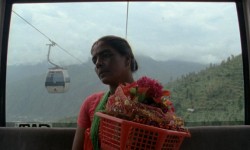
TIFF 2013: Day 5 Capsule Reviews - Song, Spring, Three Landscapes, and The Sacrament
Editor’s Notes: The following reviews are part of our coverage of the 2013 Toronto International Film Festival. For more information on the festival visit http://tiff.net and follow TIFF on Twitter at @TIFF_NET.
As one might remember from my TIFF 2013 anticipation article, Nathaniel Dorsky’s two shorts, Song and Spring were at the top of my list of films to see. I had previously seen many of his works at a conference at Harvard University where he gave the keynote address. I presented on Krzysztof Kieslowski’s Decalogue, and Dorsky and I chatted several times about his filmmaking techniques. Today, I met him again, along with Peter Hutton, to watch an incredible combination of shorts. The two acclaimed directors took the stage both before the screenings and after for a Q&A. Before I review the films, I will note some of the more interesting comments from the directors.
First off, Peter Hutton expressed a profound admiration for Dorsky’s work, calling his own piece kale and Dorskys’ dessert. He claimed that Dorsky’s films are rich, complex, and incorporate time and duration in a way like nobody else. Dorsky spoke positively about Peter Hutton’s work, which, while more self-contained, has an almost equally strong visual impression. While Dorsky films with a limitation of thirty seconds, Hutton films with an analogue camera that extends for about two and a half minutes. As a result, their editing techniques are drastically different, but both films have a superb mastery of the material quality of actual film. When asked by an audience member about their attention to detail and ability to capture so much in a single take, Dorsky responded that he takes the camera out for about four to five hours at a time. During this time, he allows himself to let the world wash over him, and spontaneously films the magic he sees. This comment of his reflects on a quote in Devotional Cinema (2006), where he states that film replicates vision, and that the skull is a theater and the world—in a sense—a screen.
Song (Nathaniel Dorsky)
Shot in San Francisco during the autumn and winter, Nathaniel Dorsky’s Song (2013) utilizes shadows, reflections, darkness, and rain to create a mysterious fable of the city. With more people than he usually films, Song is an illustration not only of the city but of the unidentified peoples traversing the city in a kind of haze. While Dorsky’s films are particularly notable for the incredible amounts of light movement within a single frame, this film is quite opposite in that it is the shadows and darkness that is most compelling. Instead of watching the light appear and retreat into the shadows, one watches the shadows loom over the light. The film is an incredible journey that mystifies as much as it allures.
Spring (Nathaniel Dorsky) Reinstating, but to greater effect, the superior aesthetic design of April (2012), Nathaniel Dorsky’s Spring (2013) is perhaps his most appreciably artistic film to date. While the epochal August and After (2012) certainly gives it a run for its money, Spring demonstrates Dorsky at his most meticulous and visually aware state. Replete with breathtaking movements of light, appearing and retreating amongst beautiful images of flowers, ocean, sand, and grass, and a pattern of mirroring and reflecting rays through transparent items to create natural superimpositions, Spring at once captures the reflective aesthetic of Andrei Tarkovsky and the light play aesthetic of Terrence Malick. Dorsky’s unique style of polyvalent open montage—images which are inherent and linked together but are a real expression of vision rather than a representation of vision—renders an incomparable evocation of beauty, love, and art. Three Landscapes (Peter Hutton) Peter Hutton’s Three Landscapes profoundly illustrates the similar nature of labour and the passage of time between three strikingly disparate landscapes. From construction workers that cross a steep bridge into the sky, farmers that toil in the vast lands of America, and stone cutters in Ethiopia who cross the desert by camelback, the film depicts movement and how physical movement relates to the movement of time. The stagnant images, slow figure movement, and long takes articulate a slowness of time that one might expect from life. The Sacrament (Ti West) West’s The Sacrament (2013) is a horrifying and well narrated documentary fiction about a mass suicide (should read genocide). Cleverly told from the perspective of documentarians, the film aptly impresses the viewer with a documentary consciousness. With hand camera movement, direct address, and a sharp narrative style, the film has a gritty sense of realism that is only surpassed by its ability to increase suspense up until its final moments. Beginning as a seemingly positive film about a lifestyle removed from society, wherein the preservation of human rights and dignity is espoused as the motivation for cult-like activities, The Sacrament drastically shifts when a young mute girl informs the filmmakers that things are not as they seem. While many are brainwashed, others are drugged, and the rest are too scared and aware of impending death if they were to revolt, the entire community suffers from the leader’s twisted ideals. The tragic fate of these people, and the atrocities forced upon them through the disguise of religious wealth—suicide as sacrament—gives the viewer a shockingly powerful image of hypocrisy.Related Posts
![]()
Kamran Ahmed
![]()
Latest posts by Kamran Ahmed (see all)






































